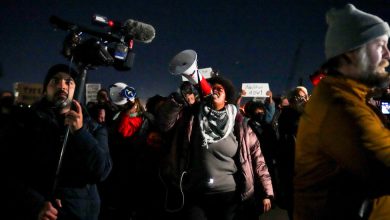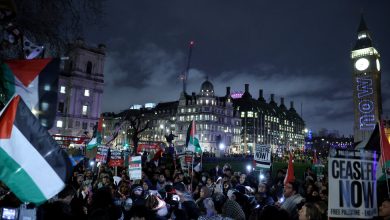In South Korea, Biden Moves to Shore Up Alliance

SEOUL — President Biden on Saturday showcased a very different approach to the Korean Peninsula from his predecessor’s, vowing to consider expanding joint military exercises with South Korea and taking a more jaundiced view of the prospect of direct talks with North Korea’s leader.
In his first meeting with President Yoon Suk-yeol, Mr. Biden sought to put the relationship with South Korea, traditionally one of the United States’ strongest allies in Asia, on a firmer foundation after the volatile years of President Donald J. Trump, who frequently undercut ties with the South while wooing the North’s mercurial dictator, Kim Jong-un.
“The alliance between the Republic of Korea and the United States has never been stronger, more vibrant or, I might add, more vital,” said Mr. Biden, using South Korea’s formal name, at a news conference in Seoul with Mr. Yoon, who was inaugurated only 11 days ago.
Unlike Mr. Trump, Mr. Biden hailed the continuing American troop presence in South Korea. “It’s emblematic of our strength and our continuing strength and the durability of our alliance and our readiness to take on all threats,” he said.
As for dealing with the nuclear-armed North, Mr. Biden was cautious and skeptical. He said the United States had already offered vaccines to North Korea to help it cope with what has been reported to be a devastating coronavirus outbreak. “We’ve gotten no response,” he said.
“With regard to whether I would meet with the leader of North Korea,” he added, “that would depend on whether he was sincere and whether it was serious.”
The president’s approach contrasted sharply with that of Mr. Trump, who during his four-year term veered wildly from threatening the North with “fire and fury” to falling “in love” with Mr. Kim.
In the end, the two leaders met three times. They reached no lasting agreement, but as part of his courtship, Mr. Trump agreed to suspend major joint military exercises with South Korea that had long irritated North Korean leaders, without first warning either Seoul or the Pentagon.
Mr. Trump also questioned why the United States still maintained a force of 28,500 troops in the country seven decades after the Korean War, leaving the Seoul government of that time uncertain about the American commitment to the alliance.
Despite Mr. Trump’s suspension of the high-profile military drills, smaller-scale joint exercises with the South Korean military continued during his term. In a joint statement on Saturday, Mr. Biden and Mr. Yoon agreed to start “discussions to expand the scope and scale” of the military exercises.
Mr. Biden said that cooperation between the United States and South Korea showed “our readiness to take on all threats together.” He also said that his administration would collaborate to confront cyberattacks from North Korea.
Mr. Yoon, who came to office promising a tougher approach to North Korea, expressed satisfaction with Mr. Biden’s stance. “President Biden and I see eye to eye on so many fronts,” Mr. Yoon said.
The new South Korean president did not rule out talks with Mr. Kim, and like his predecessor, Moon Jae-in, he offered the prospect of economic assistance for the North. But Mr. Yoon made it clear that the North would have to give up its nuclear weapons, which it has been manifestly unwilling to do. Indeed, in recent days, American intelligence officials have warned that North Korea might test a missile or a nuclear weapon during Mr. Biden’s trip to reassert itself internationally.
“The door to dialogue remains open,” Mr. Yoon said. “If North Korea genuinely embarks upon denuclearization in partnership with the international community, I am prepared to present an audacious plan that will vastly strengthen its economy and improve the quality of life for its people.”
The meeting between Mr. Biden and Mr. Yoon also underscored the degree to which Russia’s invasion of Ukraine now hovers over all of Mr. Biden’s diplomacy around the world.
“The war against Ukraine isn’t just a matter for Europe,” Mr. Biden said. “It’s an attack on democracy and the core international principles of sovereignty, and the Republic of Korea and the United States are standing together as part of a global response with our allies and partners around the world.”
The two leaders also discussed further economic cooperation at a time when the United States is struggling to secure supply chains, and they foreshadowed the formal introduction on Monday of a regional economic framework meant to coordinate policies on supply chains, digital trade, infrastructure, clean energy and other areas.
After a state dinner in Seoul on Saturday night, Mr. Biden will fly to Japan on Sunday for meetings with Prime Minister Fumio Kishida. He is also expected to meet there with the leaders of India and Australia.





